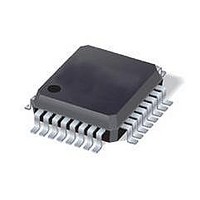ST7FLITE49K2T6 STMicroelectronics, ST7FLITE49K2T6 Datasheet - Page 144

ST7FLITE49K2T6
Manufacturer Part Number
ST7FLITE49K2T6
Description
IC MCU 8BIT 8K FLASH 32LQFP
Manufacturer
STMicroelectronics
Series
ST7r
Datasheet
1.ST7FLITE49K2T6TR.pdf
(245 pages)
Specifications of ST7FLITE49K2T6
Core Processor
ST7
Core Size
8-Bit
Speed
8MHz
Connectivity
I²C, SPI
Peripherals
LVD, POR, PWM, WDT
Number Of I /o
24
Program Memory Size
8KB (8K x 8)
Program Memory Type
FLASH
Eeprom Size
256 x 8
Ram Size
384 x 8
Voltage - Supply (vcc/vdd)
2.4 V ~ 5.5 V
Data Converters
A/D 10x10b
Oscillator Type
Internal
Operating Temperature
-40°C ~ 85°C
Package / Case
32-LQFP
Processor Series
ST7FLITE4x
Core
ST7
Data Bus Width
8 bit
Data Ram Size
384 B
Interface Type
I2C, SPI
Maximum Clock Frequency
8 MHz
Number Of Programmable I/os
24
Number Of Timers
4
Maximum Operating Temperature
+ 85 C
Mounting Style
SMD/SMT
Development Tools By Supplier
ST7FLITE-SK/RAIS, ST7FLI49M-D/RAIS, STX-RLINK
Minimum Operating Temperature
- 40 C
On-chip Adc
10 bit, 10 Channel
For Use With
497-8399 - BOARD EVAL ST7LITE49M/STLED316S497-5858 - EVAL BOARD PLAYBACK ST7FLITE
Lead Free Status / RoHS Status
Lead free / RoHS Compliant
Available stocks
Company
Part Number
Manufacturer
Quantity
Price
Company:
Part Number:
ST7FLITE49K2T6
Manufacturer:
ST
Quantity:
3 000
Company:
Part Number:
ST7FLITE49K2T6
Manufacturer:
STMicroelectronics
Quantity:
10 000
Company:
Part Number:
ST7FLITE49K2T6TR
Manufacturer:
STMicroelectronics
Quantity:
10 000
On-chip peripherals
Master mode
Note:
Note:
144/245
To switch from default Slave mode to Master mode a Start condition generation is needed.
Start condition
Setting the START bit while the BUSY bit is cleared causes the interface to switch to Master
mode (M/SL bit set) and generates a Start condition.
Once the Start condition is sent, the EVF and SB bits are set by hardware with an interrupt if
the ITE bit is set.
The master then waits for a read of the SR1 register followed by a write in the DR register
with the Slave address, holding the SCL line low (see
EV5).
Slave address transmission
1.
2.
3.
4.
5.
6.
In 10-bit addressing mode, to switch the master to Receiver mode, software must generate
a repeated Start condition and resend the header sequence with the least significant bit set
(11110xx1).
Master receiver
Following the address transmission and after SR1 and CR registers have been accessed,
the master receives bytes from the SDA line into the DR register via the internal shift
register. After each byte the interface generates in sequence:
●
●
Then the interface waits for a read of the SR1 register followed by a read of the DR register,
holding the SCL line low (see
To close the communication: before reading the last byte from the DR register, set the STOP
bit to generate the Stop condition. The interface goes automatically back to slave mode
(M/SL bit cleared).
In order to generate the non-acknowledge pulse after the last received data byte, the ACK
bit must be cleared just before reading the second last data byte.
The slave address is then sent to the SDA line via the internal shift register.
–
–
The master then waits for a read of the SR1 register followed by a write in the DR
register, holding the SCL line low (see
Then the second address byte is sent by the interface.
After completion of this transfer (and acknowledge from the slave if the ACK bit is set),
the EVF bit is set by hardware with interrupt generation if the ITE bit is set.
The master waits for a read of the SR1 register followed by a write in the CR register
(for example set PE bit), holding the SCL line low (see
EV6).
Next the master must enter Receiver or Transmitter mode.
Acknowledge pulse if the ACK bit is set
EVF and BTF bits are set by hardware with an interrupt if the ITE bit is set.
In 7-bit addressing mode, one address byte is sent.
In 10-bit addressing mode, sending the first byte including the header sequence
causes the following event. The EVF bit is set by hardware with interrupt
generation if the ITE bit is set.
Figure 71
Transfer sequencing EV7).
Figure 71
Transfer sequencing EV9).
Figure 71
Figure 71
Transfer sequencing
Transfer sequencing
ST7LITE49K2














